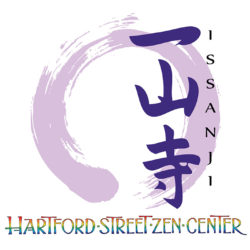 Come to HSZC this Saturday for a talk by Jana, priest-ordained at San Francisco Zen Center. Jana has been very involved with Religious Witness for the Homeless and other outreach programs for the disenfranchised, and received Dharma Transmission from retired Abbess Blanche Hartman. We’ll have 9:25 a.m. zazen, of course, then the talk at 10:15, and tea-and-cookies after. All are welcome.
Come to HSZC this Saturday for a talk by Jana, priest-ordained at San Francisco Zen Center. Jana has been very involved with Religious Witness for the Homeless and other outreach programs for the disenfranchised, and received Dharma Transmission from retired Abbess Blanche Hartman. We’ll have 9:25 a.m. zazen, of course, then the talk at 10:15, and tea-and-cookies after. All are welcome.
Annual Retreat: Winter Light – 7, 8, 9, 10, 11 December
 Our annual retreat begins Wednesday evening, 7 Dec., and ends with the Enlightenment Day Ceremony by noon on Sunday the 11th. Please join us for this special time of concentrated practice. You may participate in any of the scheduled activities in the zendo (meditation hall), but only those who have signed up in advance will be able to partake of the semi-formal meals in the dining hall. The proposed schedule is available for view by clicking this link . You can sign up for all or part of the retreat by sending email to hszc108@yahoo.com, or leaving a phone message at (415) 863-2507.
Our annual retreat begins Wednesday evening, 7 Dec., and ends with the Enlightenment Day Ceremony by noon on Sunday the 11th. Please join us for this special time of concentrated practice. You may participate in any of the scheduled activities in the zendo (meditation hall), but only those who have signed up in advance will be able to partake of the semi-formal meals in the dining hall. The proposed schedule is available for view by clicking this link . You can sign up for all or part of the retreat by sending email to hszc108@yahoo.com, or leaving a phone message at (415) 863-2507.
HSZC Board Meeting – Weds. 9 Nov.
Full-Moon Bodhisattva Ceremony – Thurs. 10 Nov.
 Please come to the temple for our monthly Bodhisattva Ceremony, where we renew our practice vows. The ceremony will begin right after the evening period of zazen, at 6:40 p.m., and take about a half-hour. Full prostrations are typically done during the ceremony, but standing bows are perfectly ok, too.
Please come to the temple for our monthly Bodhisattva Ceremony, where we renew our practice vows. The ceremony will begin right after the evening period of zazen, at 6:40 p.m., and take about a half-hour. Full prostrations are typically done during the ceremony, but standing bows are perfectly ok, too.
Veteran’s Day Holiday: no Zendo events
No Early A.M. Zazen – Tues. 1 November
Sejiki Ceremony – Feeding the Hungry Ghosts
This Saturday, 22 October, following a short Dharma talk by Rev. Myo, we’ll celebrate the ancient ceremony known in Japanese as Sejiki, or “Feeding the Jiki (wandering spirits)”. This ceremony addresses our connection to the “unseen world”, typically overlooked in the West. All aspects of our life that have been disowned, disrespected and denied are invited to come forth from exile and be nourished, a gesture that may have particular significance for members of the LGBTiQQ community, whose own place in the social order has been undermined by fear, prejudice and violence. Costumes and sundry noisemaking devices are encouraged, and everyone is invited to participate. (Time approximate after the Dharma talk, but about 11:00 a.m.)
Meditation for Modern Life Mindfulness
skills from a well being expert by Robert Puff, Ph.D.
 I’m sure you’ve noticed the thoughts that flow in and out of your mind throughout the day. I call this mind chatter. It’s the commentary we place on our experiences. Mind chatter is like thought bubbles in a comic strip. And the storyline comprises variations on two basic themes: events that took place in the past and ideas about the future. Sometimes we ignore the mind chatter, while other times it consumes all of our attention. In this blog post, I’ll explain the pitfalls of mind chatter and how to decrease its influence in our lives.
I’m sure you’ve noticed the thoughts that flow in and out of your mind throughout the day. I call this mind chatter. It’s the commentary we place on our experiences. Mind chatter is like thought bubbles in a comic strip. And the storyline comprises variations on two basic themes: events that took place in the past and ideas about the future. Sometimes we ignore the mind chatter, while other times it consumes all of our attention. In this blog post, I’ll explain the pitfalls of mind chatter and how to decrease its influence in our lives.
We’re Guests at Party and Don’t Even Know It
At any given point and time, there are countless phenomena where we can focus our attention. Unfortunately, we miss the calls to embrace the present moment because we’re so busy dwelling on the mind chatter. It’s as if we’re the honored guests at an event, but we’re so preoccupied with what happened before and what will take place after that we miss out on the actual celebration itself.
Search for a mental health professional near you.
Meditation Quiets the Mind
With a regular meditative practice we learn to turn the volume down on the mental commentary that drowns out present experience. It’s a technique for reducing the mind chatter. As we become more skilled, we can eventually lead a meditative life, one that is totally present to what is, 24 hours a day. When you’re able to do this, life will be more peaceful and cause less suffering because you’re not consumed with thoughts about the past and future.
All Techniques Lead to Stillness
The are countless ways to meditate. Whether it’s through counting breath, repeating a mantra or prayer word, or observing thoughts, the goal is the same: to quiet the mind. Thoughts may arise, but with practice, they will dissipate quickly because your attention is focused on the present moment.
As we develop our meditative practice, we transform both our spiritual and physical sides. We no longer miss out on the life that is unfolding before us that is ever changing and always new. Without the overlay of mental commentary over present experience, we lead fuller, richer lives. Consider making meditation a daily activity. Once it’s a regular part of your life, you’ll understand why it’s a practice nearly as old as human existence itself.




